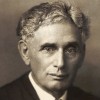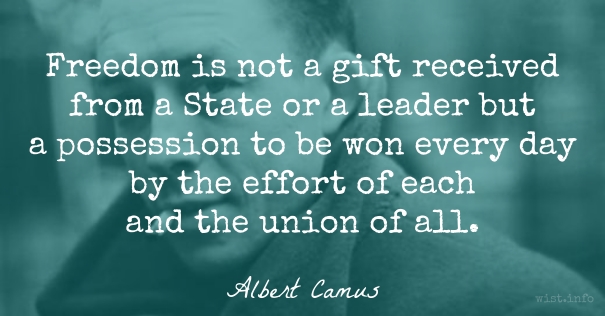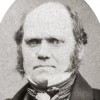The choice in politics isn’t usually between black and white. It’s between two horrible shades of gray.
Peter, Lord Thorneycroft (1909-1994) British politician.
Sunday Telegraph (11 Feb 1979)
The era of procrastination, of half-measures, of soothing and baffling expedients, of delays, is coming to its close. In its place we are entering a period of consequences.
Winston Churchill (1874-1965) British statesman and author
Speech, House of Commons (12 Nov 1936)
Full text.
We are not a cynical people. The will to believe lingers on. We like to think that heroes can emerge from obscurity, as they sometimes do; that elections do matter, even though the process is at least part hokum; that through politics we can change our society and maybe even find a cause to believe in.
The things that make good headlines attract our attention because they are on the surface of the stream of life, and they distract our attention from the slower, impalpable, imponderable movements that work below the surface and penetrate to the depths. But, of course, it is really these deeper, slower movements that, in the end, make history, and it is they that stand our huge in retrospect, when the the sensational passing events have dwindled, in perspective, to their true proportions.
Read not to contradict and confute; nor to believe and take for granted; nor to find talk and discourse; but to weigh and consider.
Francis Bacon (1561-1626) English philosopher, scientist, author, statesman
“Of Studies,” Essays, No. 50 (1625)
(Source)
The uncompromising attitude is more indicative of an inner uncertainty than of deep conviction. The implacable stand is directed more against the doubt than the assailant without.
Eric Hoffer (1902-1983) American writer, philosopher, longshoreman
The Passionate State of Mind, Aphorism 63 (1955)
(Source)
In formal logic, a contradiction is the signal of a defeat: but in the evolution of real knowledge it marks the first step in progress towards a victory. This is one great reason for the utmost toleration of variety of opinion. Once and forever, this duty of toleration has been summed up in the words, “let both grow together until the harvest.”
Alfred North Whitehead (1861-1947) English mathematician and philosopher
Science and the Modern World, ch. 12 (1925)
Reference is to Matthew 13:30.
If we insist that public life be reserved for those whose personal history is pristine, we are not going to get paragons of virtue running our affairs. We will get the very rich, who contract out the messy things in life; the very dull, who have nothing to hide and nothing to show; and the very devious, expert at covering their tracks and ambitious enough to risk their discovery.
Charles Krauthammer (1950-2018) American columnist and political commentator
“Pietygate: School for Scandal,” Time (10 Sep 1984)
Flower in the crannied wall,
I pluck you out of the crannies,
I hold you here, root and all, in my hand,
Little flower — but if I could understand
What you are, root and all, and all in all,
I should know what God and man is.
Poverty is no sinne.
George Herbert (1593-1633) Welsh priest, orator, poet.
Jacula Prudentum, or Outlandish Proverbs, Sentences, &c. (compiler), # 844 (1640 ed.)
(Source)
The moment the very name of Ireland is mentioned, the English seem to bid adieu to common feeling, common prudence, and common sense, and to act with the barbarity of tyrants, and the fatuity of idiots.
DOTTY: Archie says the Church is a monument to irrationality.
GEORGE: … The National Gallery is a monument to irrationality! Every concert hall is a monument to irrationality! — and so is a nicely kept garden, or a lover’s favour, or a home for stray dogs! You stupid woman, if rationality were the criterion for things being allowed to exist, the world would be one gigantic field of soya beans!
Be careful. People like to be told what they already know. Remember that. They get uncomfortable when you tell them new things. New things … well, new things aren’t what they expect. They like to know that, say, a dog will bite a man. That is what dogs do. They don’t want to know that man bites a dog, because the world is not supposed to happen like that. In short, what people think they want is news, but what they really crave is olds … Not news but olds, telling people that what they think they already know is true.
“Experience iz a good schoolmaster,” but reason iz a better one.
[“Experience is a good schoolmaster,” but reason is a better one.]
Josh Billings (1818-1885) American humorist, aphorist [pseud. of Henry Wheeler Shaw]
Everybody’s Friend, Or; Josh Billing’s Encyclopedia and Proverbial Philosophy of Wit and Humor, ch. 148 “Affurisms: Ink Brats” (1874)
(Source)
We cannot know whether we love God, although there may be strong reason for thinking so; but there can be no doubt about whether we love our neighbor or not. Be sure that, in proportion as you advance in fraternal charity, you are increasing your love of God, for His Majesty bears so tender an affection for us that I cannot doubt He will repay our love for others by augmenting, and in a thousand different ways, that which we bear for Him.
Enquire of the Teachers of Christianity for the ages in which it appeared in its greatest lustre; those of every sect, point to the ages prior to its incorporation with Civil policy. Propose a restoration of this primitive State in which its Teachers depended on the voluntary rewards of their flocks, many of them predict its downfall. On which Side ought their testimony to have greatest weight, when for or when against their interest?
James Madison (1751-1836) American statesman, political theorist, US President (1809-17)
“A Memorial and Remonstrance Against Religious Assessments,” letter to the Virginia Assembly (20 Jun 1785)
On a proposed law to have the state financially support "Teachers of the Christian Religion." Full text.
Those who won our independence believed that the final end of the State was to make men free to develop their faculties. … They valued liberty both as an end and as a means. They believed liberty to be the secret of happiness and courage to be the secret of liberty. They believed that freedom to think as you will and to speak as you think are means indispensable to the discovery and spread of political truth; that without free speech and assembly discussion would be futile; that with them, discussion affords ordinarily adequate protection against the dissemination of noxious doctrine; that the greatest menace to freedom is an inert people; that public discussion is a political duty; and that this should be a fundamental principle of the American Government.
It behooves every man, who values liberty of conscience for himself, to resist invasions of it in the case of others; or their case may, by change of circumstances, become his own. It behooves him, too, in his own case, to give no example of concession, betraying the common right of independent opinion, by answering questions of faith, which the laws have left between God and himself.
Thomas Jefferson (1743-1826) American political philosopher, polymath, statesman, US President (1801-09)
Letter to Benjamin Rush (21 Apr 1803)
(Source)
And is it possible, Cleanthes, said Philo, that after all these reflections, and infinitely more, which might be suggested, you can still persevere in your Anthropomorphism, and assert the moral attributes of the Deity, his justice, benevolence, mercy, and rectitude, to be of the same nature with these virtues in human creatures? His power we allow is infinite: whatever he wills is executed: but neither man nor any other animal is happy: therefore he does not will their happiness. His wisdom is infinite: he is never mistaken in choosing the means to any end: but the course of Nature tends not to human or animal felicity: therefore it is not established for that purpose. Through the whole compass of human knowledge, there are no inferences more certain and infallible than these. In what respect, then, do his benevolence and mercy resemble the benevolence and mercy of men?
Epicurus (341-270 BC) Greek philosopher
(Attributed)
In David Hume (1711-1776), Dialogues Concerning Natural Religion, Part X (1779). Full text. Not found in the surviving writings of Epicurus.
This immediately precedes Epicurus' Old Riddle.
All great events hang by a single thread. The clever man takes advantage of everything, neglects nothing that may give him some added opportunity; the less clever man, by neglecting one thing, sometimes misses everything.
God Almighty first planted a garden. And indeed it is the purest of human pleasures.
Francis Bacon (1561-1626) English philosopher, scientist, author, statesman
“Of Gardens,” Essays, No. 46 (1625)
(Source)
When a man does all he can though it Succeeds not well, blame not him that did it.
Living well is the best revenge.
George Herbert (1593-1633) Welsh priest, orator, poet.
Jacula Prudentum, or Outlandish Proverbs, Sentences, &c. (compiler), # 524 (1640 ed.)
(Source)
Perhaps a variant of John Lyly (1579): "The greatest harm that you can do unto the envious, is to do well."
“When the Son of man comes in his glory, and all the angels with him, then he will sit on his glorious throne. Before him will be gathered all the nations, and he will separate them one from another as a shepherd separates the sheep from the goats, and he will place the sheep at his right hand, but the goats at the left.
“Then the King will say to those at his right hand, ‘Come, O blessed of my Father, inherit the kingdom prepared for you from the foundation of the world; for I was hungry and you gave me food, I was thirsty and you gave me drink, I was a stranger and you welcomed me, I was naked and you clothed me, I was sick and you visited me, I was in prison and you came to me.’
“Then the righteous will answer him, ‘Lord, when did we see thee hungry and feed thee, or thirsty and give thee drink? And when did we see thee a stranger and welcome thee, or naked and clothe thee? And when did we see thee sick or in prison and visit thee?’ And the King will answer them, ‘Truly, I say to you, as you did it to one of the least of these my brethren, you did it to me.’
“Then he will say to those at his left hand, ‘Depart from me, you cursed, into the eternal fire prepared for the devil and his angels; for I was hungry and you gave me no food, I was thirsty and you gave me no drink, I was a stranger and you did not welcome me, naked and you did not clothe me, sick and in prison and you did not visit me.’
“Then they also will answer, ‘Lord, when did we see thee hungry or thirsty or a stranger or naked or sick or in prison, and did not minister to thee?’ Then he will answer them, ‘Truly, I say to you, as you did it not to one of the least of these, you did it not to me.’ And they will go away into eternal punishment, but the righteous into eternal life.”
The faults of others console us in our own.
Paul Eldridge (1888-1982) American educator, novelist, poet
Maxims for a Modern Man, #2178 (1965)
(Source)
O stranger, cease thy care;
Wise is the soul, but man is born to bear;
Jove weighs affairs of earth in dubious scales,
And the good suffers, while the bad prevails.
Bear, with a soul resign’d, the will of Jove;
Who breathes, must mourn: thy woes are from above.[‘ξεῖν᾽, ἐπεὶ οὔτε κακῷ οὔτ᾽ ἄφρονι φωτὶ ἔοικας:
Ζεὺς δ᾽ αὐτὸς νέμει ὄλβον Ὀλύμπιος ἀνθρώποισιν,
ἐσθλοῖς ἠδὲ κακοῖσιν, ὅπως ἐθέλῃσιν, ἑκάστῳ:
καί που σοὶ τάδ᾽ ἔδωκε, σὲ δὲ χρὴ τετλάμεν ἔμπης.]Homer (fl. 7th-8th C. BC) Greek author
The Odyssey [Ὀδύσσεια], Book 6, l. 187ff (6.187-190) (c. 700 BC) [tr. Pope (1725), l. 227ff]
(Source)
(Source (Greek)). Alternate translations:
Stranger! I discern in thee
Nor sloth, nor folly, reigns; and yet I see
Th’ art poor and wretched. In which I conclude,
That industry nor wisdom make endued
Men with those gifts that make them best to th’ eye;
Jove only orders man’s felicity.
To good and bad his pleasure fashions still
The whole proportion of their good and ill.
And he, perhaps, hath form’d this plight in thee,
Of which thou must be patient, as he free.
[tr. Chapman (1616)]
You seem to be a good man and discreet,
But Jove on good and bad such fortune lays,v Happy or otherwise, as he thinks meet;
And since distress is fallen to your share,
You must contented be to suffer it.
[tr. Hobbes (1675), l. 178ff]
Since, stranger! neither base by birth thou seem’st,
Nor unintelligent, (but Jove, the King
Olympian, gives to good and bad alike
Prosperity according to his will,
And grief to thee, which thou must patient bear,)
[tr. Cowper (1792), l. 233ff]
Stranger, who seemest neither vile nor vain,
Zeus both to good and evil doth divide
Wealth as he listeth. He perchance this pain
Appointed; thou thy sorrow must sustain.
[tr. Worsley (1861), st. 25]
Nor vice, nor folly marks thee -- and great Jove
In high Olympus thron'd doth this world's good
To men mete out, the wicked and the just,
E'en as to Him seems best: and this thy lot
He haply hath assign'd;' and 'tis for thee
With patient soul to bear it.
[tr. Musgrave (1869), l. 289ff]
Sir guest! since thou no sorry wight dost seem;
And Zeus himself from Olympus deals out weal
To the good and band: -- to each as it pleaseth him:
And somehow he hath sent these things to thee;
So it becomes thee to endure them wholly.
[tr. Bigge-Wither (1869)]
Stranger, forasmuch as thou seemest no evil man nor foolish -- and it is Olympian Zeus himself that giveth weal to men, to the good and to the evil, to each one as he will, and this thy lot doubtless is of him, and so thou must in anywise endure it.
[tr. Butcher/Lang (1879)]
O guest, forsooth thou seemest no fool, and no man of ill.
But Zeus the Olympian giveth to menfolk after his will,
To each, be he good, be he evil, his share of the happy day;
And these things shall be of his giving; so bear it as ye may.
[tr. Morris (1887)]
Stranger, because you do not seem a common, senseless person, -- and Olympian Zeus himself distributes fortune to mankind and gives to high and low even as he wills to each; and this he gave to you, and you must bear it therefore.
[tr. Palmer (1891)]
Stranger, you appear to be a sensible, well-disposed person. There is no accounting for luck; Zeus gives prosperity to rich and poor just as he chooses, so you must take what he has seen fit to send you, and make the best of it.
[tr. Butler (1898), rev. Power/Nagy]
Stranger, since thou seemest to be neither an evil man nor a witless, and it is Zeus himself, the Olympian, that gives happy fortune to men, both to the good and the evil, to each man as he will; so to thee, I ween, he has given this lot, and thou must in any case endure it.
[tr. Murray (1919)]
Stranger -- for to me you seem no bad or thoughtless man -- it is Zeus himself who assigns bliss to men, to the good adn to the evil as he wills, to each his lot. Wherefore surely he gave you this unhappiness, and you must bear it.
[tr. Lawrence (1932)]
"Sir," said the white-armed Nausicaa, "your manners prove that you are no rascal and no fool; and as for these ordeals of yours, they must have been sent you by Olympian Zeus, who follows his own will in dispensing happiness to people whatever their merits. You have no choice but to endure."
[tr. Rieu (1946)]
Stranger, there is no quirk or evil in you
that I can see. You know Zeus metes out fortune
to good and bad men as it pleases him.
Hardship he sent to you, and you must bear it.
[tr. Fitzgerald (1961)]
My friend, since you seem not like a thoughtless man, nor a mean one,
it is Zeus himself, the Olympian, who gives people good fortune,
to each single man, to the good and the bad, just as he wishes;
and since he must have given you yours, you must even endure it.
[tr. Lattimore (1965)]
You, stranger, since you do not seem to be
mad or malicious, know that only he --
Olympian Zeus -- allots felicity
to men, to both the noble and the base,
just as he wills. To you he gave this fate
and you must suffer it -- in any case.
[tr. Mandelbaum (1990)]
"Stranger," the white-armed princess answered staunchly,
"friend, you're hardly a wicked man, and no fool, I'd say --
it's Olympian Zeus himself who hands our fortunes out,
to each of us in turn, to the good and bad,
however Zeus prefers ...
He gave you pain, it seems. You simply have to bear it.
[tr. Fagles (1996)]
"Stranger, you do not seem to be a bad man
Or a fool. Zeus himself, the Olympian god,
Sends happiness to good men and bad men both,
To each as he wills. To you he has given these troubles,
Which you have no choice but to bear.
[tr. Lombardo (2000), l. 191ff]
Stranger -- because you seem neither base nor without understanding
Zeus himself, the Olympian, gives out fortune to mankind,
both to the base and the noble, to each one just as he wishes;
so he has given you this, yet nevertheless you must bear it.
[tr. Merrill (2002)]
Since your manners show you are not a bad man or a fool -- it is Olympian Zeus himself who assigns good fortune to men, good and bad alike, as he wills, and must have sent you your personal misfortune -- and you must just endure it.
[tr. DCH Rieu (2002)]
Stranger, you do not strike me as either a rogue or a fool. It is Olympian Zeus himself who dispenses prosperity to men, to both good and bad, to each as he wishes; he must surely have sent you these troubles, and you must bear them as you may.
[tr. Verity (2016)]
Well, stranger, you seem a brave and clever man; you know that Zeus apportions happiness to people, to good and bad, each one as he decides. your troubles come from him, and you must bear them.
[tr. Wilson (2017)]
Stranger, you seem neither malicious nor witless: but it's Zeus, the Olympian in person, who bestows good fortune on men, the good and the bad, to each as he wills; I suppose he chose this lot for you, and you just have to bear it.
[tr. Green (2018)]
Stranger, you don’t seem to be a wicked man,
or foolish. Olympian Zeus himself
gives happiness to bad and worthy men,
each one receiving just what Zeus desires.
So he has given you your share, I think.
Nonetheless, you must still endure your lot.
[tr. Johnston (2019), l. 241ff]
He who shuts out truth, by the same act opens the door to all the error that supplies its place. Ignorance breeds monsters to fill up the vacancies of the soul that are unoccupied by the verities of knowledge.
God gave us faculties for our use; each of them will receive its proper reward. Then do not let us try to charm them to sleep, but permit them to do their work until divinely called to something higher.
From the war of nature, from famine and death, the most exalted object which we are capable of conceiving, namely, the production of the higher animals, directly follows. There is grandeur in this view of life, with its several powers, having been originally breathed into a few forms or into one; and that, whilst this planet has gone cycling on according to the fixed law of gravity, from so simple a beginning endless forms most beautiful and most wonderful have been, and are being evolved.
Dance like no one is watching. Sing like no one is listening. Love like you’ve never been hurt and live like it’s heaven on Earth.
William W. Purkey (b. 1929) American educator, academic, author
(Attributed)
Also attributed to Mark Twain, Alfred D. Souza (or Alfred D'Souza), Satchel Paige, and "an Irish proverb." The phrase was popularized in Susannah Clark & Richard Leigh's 1987 song "Come from the Heart."
Correspondence with Purkey in 2001 is quoted here. He said the original version was:
You've gotta' dance like there's nobody watching,
Love like you'll never be hurt.
Sing like there's nobody listening,
And live like it's heaven on earth.
(And speak from the heart to be heard.)Another variation (there are many out there):
Work like you don't need the money
dance like no one is watching
sing like no one is listening
love like you've never been hurt
and live life every day as if it were your last
A man must live by his lights and do what little he can and do it as best he can. In this world goodness is destined to be defeated. But a man must go down fighting. That is the victory. To do anything less is to be less than a man.
Fashion is something barbarous, for it produces innovation without reason and imitation without benefit.
George Santayana (1863-1952) Spanish-American poet and philosopher [Jorge Agustín Nicolás Ruíz de Santayana y Borrás]
The Life of Reason or The Phases of Human Progress, Vol. 3 “Reason in Religion, ch. 7 (1905-06)
(Source)
A crowd is not company; and faces are but a gallery of pictures; and talk but a tinkling cymbal, where there is no love.
Francis Bacon (1561-1626) English philosopher, scientist, author, statesman
“Of Friendship,” Essays, No. 27 (1625)
(Source)
The truth seems to be that propaganda on its own cannot force its way into unwilling minds; neither can it inculcate something wholly new; nor can it keep people persuaded once they have ceased to believe. It penetrates only into minds already open, and rather than instill opinion it articulates and justifies opinions already present in the minds of its recipients. The gifted propagandist brings to a boil ideas and passions already simmering in the minds of his hearers. he echoes their innermost feelings. Where opinion is not coerced, people can be made to believe only in what they already “know.”
Above all, the prophets remind us of the moral state of a people: Few are guilty, but all are responsible.
Abraham Joshua Heschel (1907-1972) Polish-American rabbi, theologian, philosopher
The Prophets, ch. 1 “What Manner of Man is the Prophet?” (1962)
(Source)
At a New York City Town Hall speech (1966): "In a free society all are involved in what some are doing. Some are guilty, all are responsible."







































